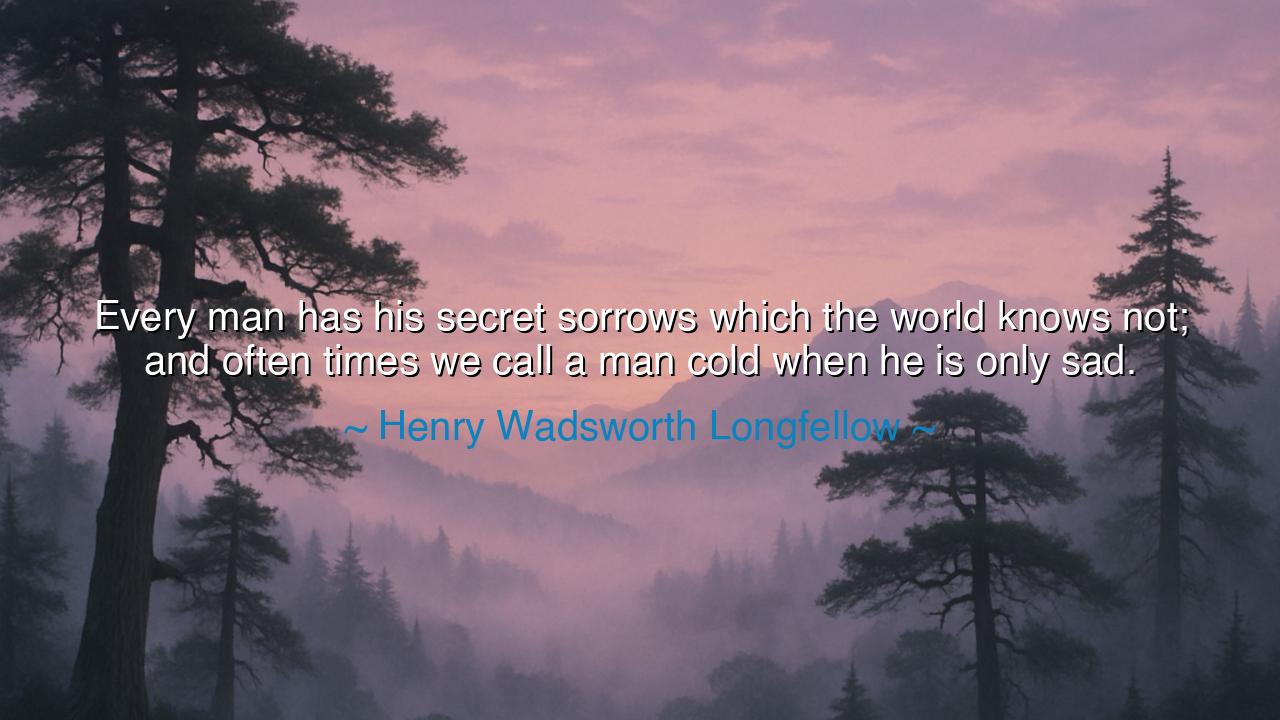
Every man has his secret sorrows which the world knows not; and
Every man has his secret sorrows which the world knows not; and often times we call a man cold when he is only sad.






The immortal words of Henry Wadsworth Longfellow, “Every man has his secret sorrows which the world knows not; and often times we call a man cold when he is only sad,” flow from the deep river of human experience. They speak to the hidden battles that dwell within every heart, the unspoken griefs that shape the soul in silence. Longfellow, a poet whose life was marked by both beauty and tragedy, wrote these words not as mere observation, but as revelation — the wisdom of one who had walked through the shadowed valleys of loss and learned to see beyond appearances.
To understand his words, we must first remember the life from which they arose. Henry Wadsworth Longfellow was a man who knew sorrow intimately. He lost his first wife to illness, and years later, his second wife perished in a terrible fire before his eyes. He himself was scarred trying to save her. From that day forward, he wore a beard to hide his wounds — a living symbol of his pain. And yet, though the world saw only the dignified poet, beneath his calm exterior dwelt a heart forever haunted by grief. Thus he wrote, not from theory but from truth: that beneath every calm face may lie storms unseen, and that judgment without understanding is the cruelty of the unknowing.
The ancients, too, spoke of this truth. They said that the soul carries two faces — one for the world, and one known only to the gods. In the halls of kings and in the huts of shepherds, the same rule has held: each human being bears private sorrows that no eye can see. Yet society, ever swift to judge, confuses silence with indifference, and composure with coldness. We look upon those who do not weep and think them unfeeling, not knowing that they have wept until no tears remain. Longfellow’s words are a call to compassion, a plea for gentleness in how we view others, for the quiet soul may be carrying the heaviest burden of all.
Consider the life of Abraham Lincoln, whose melancholy was as constant as his wisdom. To the public, he appeared stern, solemn, even detached. Yet those close to him knew that his heart bled for the suffering of others. The death of his son, the horrors of the Civil War, and the immense weight of leadership bore down upon him, yet he carried it with silence and grace. Many mistook his stillness for coldness, but as Longfellow teaches, it was not the absence of feeling, but the depth of it, that made him appear so. Like Lincoln, countless souls in every age endure their griefs unseen, maintaining composure not because they feel less, but because they have learned the art of enduring more.
There is a sacred dignity in this kind of sorrow — the sorrow that does not demand attention, that moves quietly through life’s corridors, shaping empathy and wisdom. The ancients would have called it the discipline of the heart, the ability to suffer without bitterness, to love still, even when wounded. Yet it also reminds us of our duty: to look upon one another with mercy. When we see someone withdrawn, aloof, or stern, let us not rush to condemn them as heartless. For perhaps they, like Longfellow, bear a fire within that the world cannot see. Kindness, therefore, becomes a form of reverence — an acknowledgment that every person’s story runs deeper than our eyes can reach.
Longfellow’s insight also calls us to courage within ourselves. For each of us, too, carries secret sorrows — memories of failure, loss, or love unmet. There is no shame in them. To feel deeply is not weakness, but proof of the soul’s vitality. Yet we must learn, as he did, to transform sorrow into strength, and pain into compassion. When we acknowledge our wounds without letting them define us, we become healers of others’ hearts as well as our own. In this way, our sadness does not isolate us; it connects us to the great fellowship of humanity — to every soul that has ever known grief and still chosen to live with love.
The lesson, then, is this: be slow to judge, and quick to show compassion. For you cannot know the invisible burdens another bears. Speak gently, smile often, and offer kindness freely, for even the smallest act of warmth can rekindle hope in a weary heart. And within yourself, honor your sorrows — they are the proof that you have loved, that you have risked, that you have lived. As Longfellow teaches, the soul that feels sorrow most deeply is also the one most capable of understanding joy.
So, children of tomorrow, remember this truth: the world is full of hidden sorrows, and every heart has its own battlefield. Do not mistake silence for coldness, nor composure for emptiness. Behind every quiet gaze may dwell a history of tears, and within every broken heart may glow the embers of extraordinary strength. To live with empathy is to live wisely. To live with kindness is to live nobly. And to understand the sorrow of another — that is the beginning of love itself.






AAdministratorAdministrator
Welcome, honored guests. Please leave a comment, we will respond soon